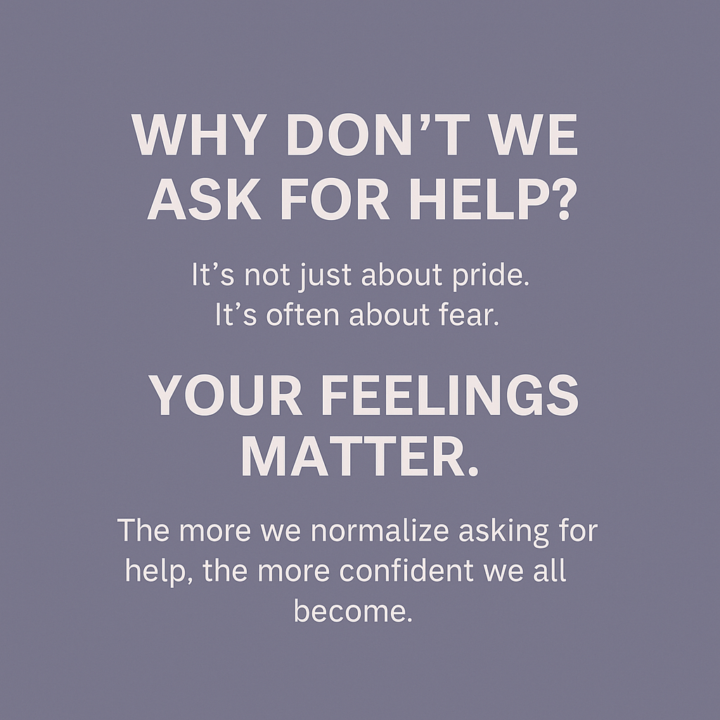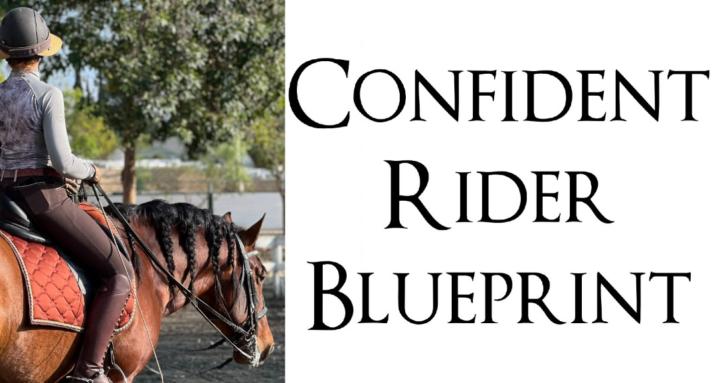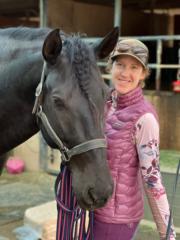Confidence Goes Both Ways
Many riders rely on their horse to give them confidence. And many horses are "confidence building types" with laid back personalities and a willingness to overlook a rider's bobbles. But the job of the rider is to direct the horse and for our horses to do their best, they need to get confidence from us as much as we get confidence from them. I like to remind riders of this because in order to set ourselves up for long term success, we often need to work on ourselves before we can work on the horse. This means that you should set small goals for yourself and then, as you meet them, set a similar goal for your horse. What does this look like? Let me give you an example: If you're not feeling secure about cantering, don't worry that the canter is imperfect or your horse isn't staying in the canter for more than a few steps when you ask. Instead, focus on riding a good trot into the canter transition - and getting some help from a ground person or in the round pen. After you feel you can comfortably maintain the trot into the canter, then you can refocus on your horse and start to build more stamina in the canter. If you build up a little more security in your transition, you'll ride a better canter and your horse will feel more confident to build it with you.
0
0

Coaching Red Flags?
Have you ever had a coach where, in hindsight, there were some red flags for training with them? Bad coaching can really have a negative impact on a rider's confidence. One of the hardest things to do is to walk away from a trainer where there are red flags because the trainer can exert a lot of control over how the rider feels about their decisions. Keep your mental health and your horse's interest in your heart! This isn't to say that some lessons might be more challenging than others, but there is a difference between a challenge and something more negative.
1
0
Why Don’t We Ask for Help?
So many riders struggle silently—unsure if it’s “okay” to say they’re nervous, confused, or frustrated.Sometimes they don’t want to seem difficult.Sometimes they assume the trainer already knows what’s going on.And sometimes… they’re just not used to being heard. I always encourage riders to speak up and tell me what they’re feeling. Most of the time, I can tell when something’s off—but not always. And I know a lot of trainers don’t take the time or don’t think it’s part of their job! But here’s the truth: Your feelings matter. You are there to learn and improve—not to hold on to fear, tension or doubt that will hold you back! Ask yourself: Have you ever held back from asking for help—even when you needed it? What stopped you—and what would’ve made it easier to speak up?
4
0

Communication leads to Good Coaching
Yelling doesn't make someone a good coach - and getting yelled at doesn't make someone a better rider! A good coach should inspire through clear communication and help riders find motivation through progress. Yet we've all seen riders who stick with trainers that don't seem to build them up. Have you ever ridden with a trainer where you saw any of these red flags?
3
0
Monday Motivation and Weekly Check in!
A late transition. A drifting circle. A crooked line. These can seem like "wrong answers" from the horse. But did your horse still slow down even though you asked for a halt? Did your horse speed up even though you asked for a trot? Your horse heard you and tried! And if you ride that try—by softening, redirecting, and praising—you’ll keep the conversation open! Ask your horse: “How can I help you find the right answer?” 💬 Question for riders: Do you feel like your horse is trying? Even if it isn't perfect?
1-8 of 8

skool.com/confident-rider-blueprint
A supportive equestrian community to build confidence, refine skills, and grow as a rider—no matter your level. Ride with clarity & confidence!
Powered by

